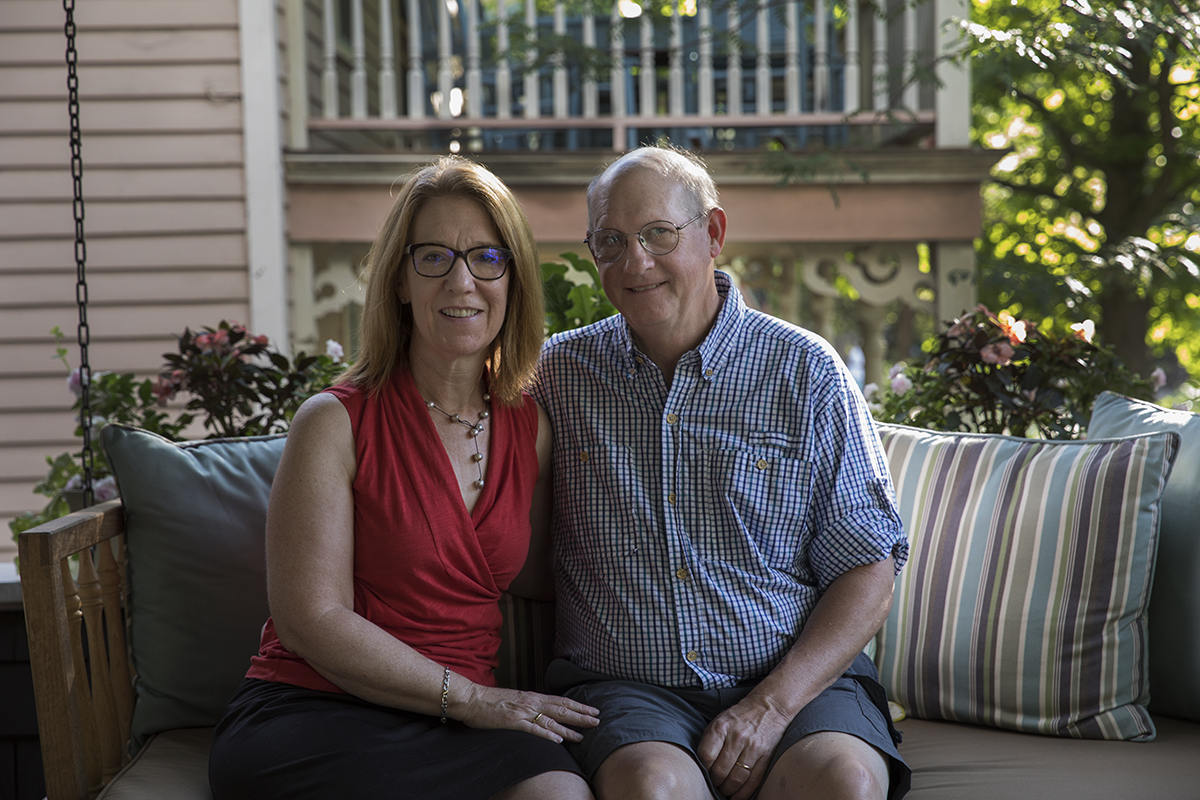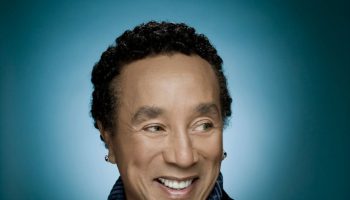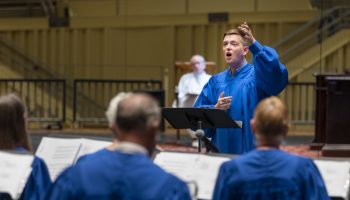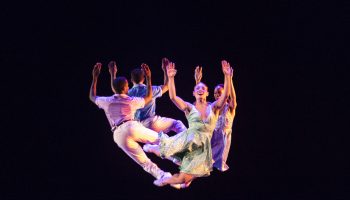The term “lifelong Chautauquan” rarely applies as authentically as it does to departing trustee Laura Currie. She was born in Jamestown, attended school across Route 394, lived on the grounds, had childhood and long-term friendships both inside the gates and in the community, and never spiritually left despite continuing to reside in Nashville with her husband, Brad, for many years during the off-season.
As she rolls off the board after eight years, Currie has been an integral part of many of the most significant developments at Chautauqua over that period, including the presidential search, Amphitheater project and close collaboration between the board of trustees and the Chautauqua Foundation. We spoke on her porch near Lincoln Park.
You really are a Chautauquan with deep roots.
Yes, I am. I was born in Jamestown and spent summers here on the grounds until I was in the fourth grade. My parents got tired of doing the back and forth across the lake, so they sold our old house and bought a place here. They bought a house on North Lake Drive, you know, past the Strohls’, past Mary Boyle’s house, past the old president’s house. They’ve renumbered the houses and I don’t recall what the number is now. But Brad’s and my wedding reception was in the front yard of that house. Our wedding was in Hurlbut Church because that was my home church. My parents later sold that house, but stayed in the area.
I attended high school across the road (Route 394) after going to elementary school at Turner School. I am a bit of an odd duck, I guess. People ask me “Where are you from?” and my answer is, well, here! There was a small posse of us kids who lived here on the grounds all year round. In some ways, we had the best of both worlds.
You left for college?
Yes, I went to Vanderbilt, met Brad there, got “stuck,” as we say. We live right in Nashville. We live in an area where, 25 years ago, we would not have been living. The revival in downtown Nashville has been phenomenal. And, like in Florida, there is no state income tax in Tennessee. The politics, all things considered, are reasonable. There are jobs. People say there is a net influx into Nashville of 1,000 people per week.
Sometimes people experience a Chautauqua hiatus as young married people, then with little kids.
Not us. We spent some part of every single summer here. When the kids came, they started at Children’s School. My parents were living again across the lake, so we were back to commuting across the lake. But then we started renting on the grounds, first for only a week, in 1997.
I remember at the end of that week, it was a Friday evening. We were walking on the north end, and I said to Brad, “You’re going to think I’m crazy.” Typically, he said, “Try me.” I said, “I want to spend the whole summer up here, but I want to rent my own place. I don’t want to stay with my parents.” He said, “Go for it.” I looked around and found a place, and that began a series of season-long rentals in three different locations until we bought this place in 2006. Brad found that he was able to work from here in the summer, too. We were beta testers for the cable modems here. We had two phone lines in the house.
Could you talk about your and Brad’s professional lives?
Brad is an asset manager in the financial services industry. He used to be a broker. He made a decision to leave a corporate job because he wanted to be hand in hand with me raising the kids. His office is in the house, and we were at every swim meet, dance recital, teacher meeting and concert. We did share in raising the kids.
I am a nurse by training, and have settled in over the last 18 years in research for the pediatric cancer department at Vanderbilt. I’m involved in the clinical trials program there.
It sounds like you started on the ground floor in cancer research, you grew and were given greater responsibilities.
Right, but life takes twists and turns. In college, I was accepted for a summer job at St. Jude’s Children’s Hospital in Memphis, but I wasn’t sure I could handle being around kids with cancer all the time. I took a different position in Atlanta. So we’re in orientation there, and at the end of the day they gave us our assignments. Mine was on the pediatric cancer floor. Go figure!
After graduation I did work in pediatric intensive care. After our kids were born, I got more into home research and started a company from home, and one thing led to another. I have been running a research group at Vanderbilt full-time for three years now. I have just hired someone to negotiate our contracts, which will relieve me of some of what I have been doing.
Are you still in touch with your nursing roots?
In a way, I am. Here’s an example. Earlier this year we had a little girl with a condition only three children in the world are known to have. I was called into the office at 5 o’clock Thursday afternoon and by 10 o’clock Saturday we had the drug in hand. We were able to save this child’s life. I was very involved with the child and with the family for a while. It felt wonderful to have that kind of positive impact on them.
How did you become who you are at Chautauqua?
I must say, when they called me to join the board of trustees, I was pretty shocked. Like so many things here, it’s a bit of a story. It goes back to when we were looking for a place to buy. We were interested in this place where we are sitting, and it turned out the seller was the uncle of someone then on the board. So that started an acquaintance. Meanwhile, I was a Chautauqua Fund volunteer, and Brad and I were part of a focus group when they were starting to work on a strategic plan. I was also the chair of the Chautauqua in the Digital Age study group. So I was doing different things for Chautauqua, but not really thinking about board membership for myself. It seems they were thinking about it, though.
How has the board evolved during your decade or so of involvement?
Well, the nominating process has definitely evolved into a more strategic process. There is a strong desire to seek people with particular skill sets that fit what the board needs. I was reflecting this year on all the people I have served with over these years on the board. They were all amazing, and so dedicated to Chautauqua. Each brought something important to the table. I have been on other boards, but nothing like this.
It’s hard to put your finger on why that is, but maybe it stems from all being from different places, different backgrounds, yet united in pursuing what is best for this place.
What were your committee assignments?
During my first year, I was on Program Policy. Then the following February (2010), the Amp study group was formed. Construction on what is now Hagen-Wensley House was underway. The current strategic plan that runs through 2018 was approved at my first board meeting. I understood that plan was the first that was not based on development. First the strategy, then raise the money. The Promise Campaign was the result.
Anyhow, when the Amp study group was formed in early 2010, I was the only board member on it. Others joined subsequently. Only (fellow trustee) John Milos and I have been there on that group for the whole time. We can see our last meeting in the very near future. I will say the whole Amp project has been an amazing journey.
We knew there was disagreement in the community about the Amp project, but we felt strongly that we needed to do what was right for Chautauqua. Once we got in there and saw that the old Amp wasn’t really properly anchored and we looked closely at the building, there was no question about what needed to be done.
That first year, we had community briefings in the Amp. (Former Institution Vice President for Community Planning and Design) Charlie Heinz led many of them. I went to them all, took notes on questions and answers, and talked with people who attended. I do think that what we now enjoy reflected what the community was telling us all those years ago. They wanted to keep the feel of the place, the columns. When we got here this June, I was standing down by the Amp one evening with the dogs and there were people walking by saying, “I thought they said they were going to take the Amp down.”
I found that it was very important that Tom Becker brought in (Institution historian) Jon Schmitz into the process early. (Schmitz) was able to explain to us and to the community how the old Amp evolved and developed, and that was revealing. For example, the bleachers lining the bowl in more recent times had the effect of closing off the arena. Further back in time, the metal little league type open back bleachers had not had that effect. I believe that the point of the Amp is to permit us all to gather under one roof, and the new building does a better job of that. And you cannot overstate the importance of the accessibility in the new Amp. It is very significant for a lot of people.
What about other committee assignments?
I joined the Nominating and Governance Committee, and later on, the Personnel Committee. I chaired Personnel for several years. But then someone who had been a trustee-director (membership on both the board of trustees and Foundation board) had to leave, and (Foundation and Institution board chairs) Steve Percy and George Snyder asked me to take on that role. From my point of view, the boards have worked in very close and productive collaboration during my eight years. The focus has always been on what is best for Chautauqua.
What is Chautauqua like in 2040?
I hope even stronger than it is now, and I believe we are on a trajectory for that. I was on the search committee for our new president. As we prepared for that assignment, we realized we are in a better place with finances and the physical plant than we have been, maybe ever. What a gift for a new administration! And anyone who follows the political news knows we as a nation need Chautauqua more than ever.
I certainly see the potential of digital communication in our future, but in a way, we are the antithesis of that: We stand for speaking to each other face to face. I think people will want that; you can never replace that. You cannot be anonymous when you are sitting speaking with them. It’s more of a real conversation.
Maybe Chautauqua played a larger international role 30 years ago with the Russia trips; that would be an area where we could perhaps have more influence in the future. Our new president can certainly lead us in these and other exciting directions.
And Chautauqua, I think, will continue getting more diverse in many ways. Look at all the people who are here now from the West Coast, Atlanta, Texas. That was not previously the case, but these trends will continue.
What is the potential for Chautauqua and the county?
Having grown up here, I can tell you it is huge. I really believe the Institution can play a large role in bringing the county back. We know the economic impact on the county of the Institution, and Michael Hill is talking to the county executive and others about possibilities. I love what (Vice President and Director of Programming) Deborah Sunya Moore has done in the local schools. The overall accessibility of the Institution is very much on our minds, and different kinds of philanthropy can perhaps have an impact there. We’re trying to look at everything. But the future for Chautauqua is very bright indeed.





